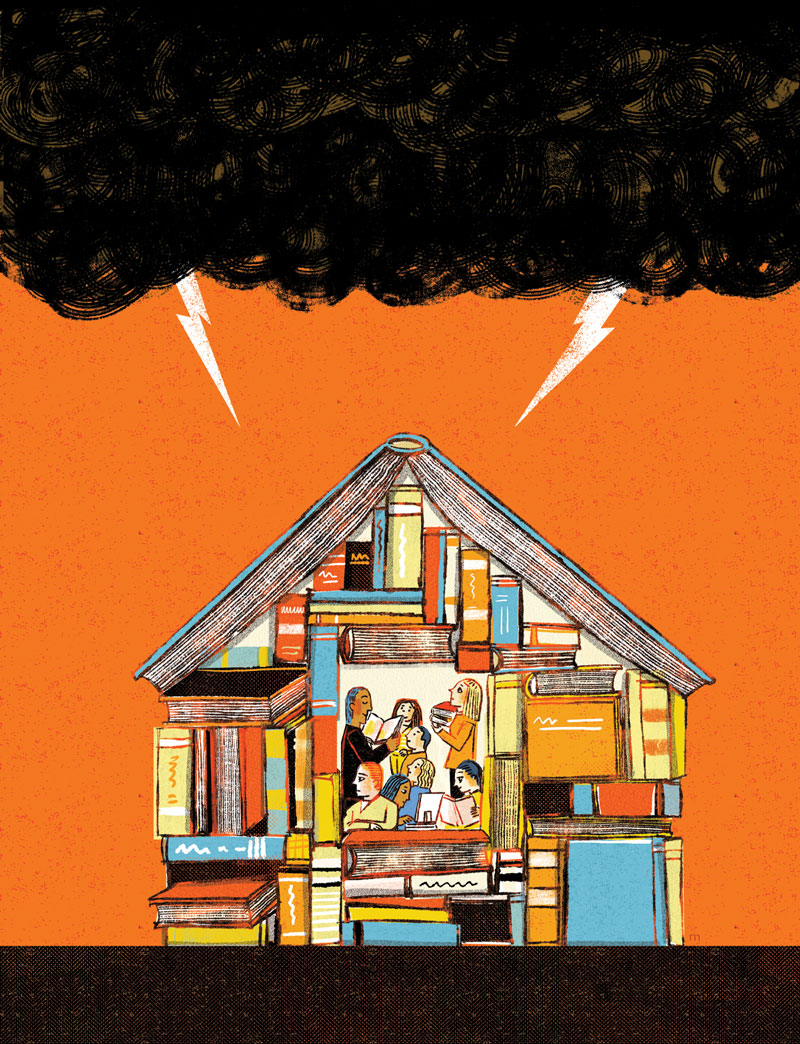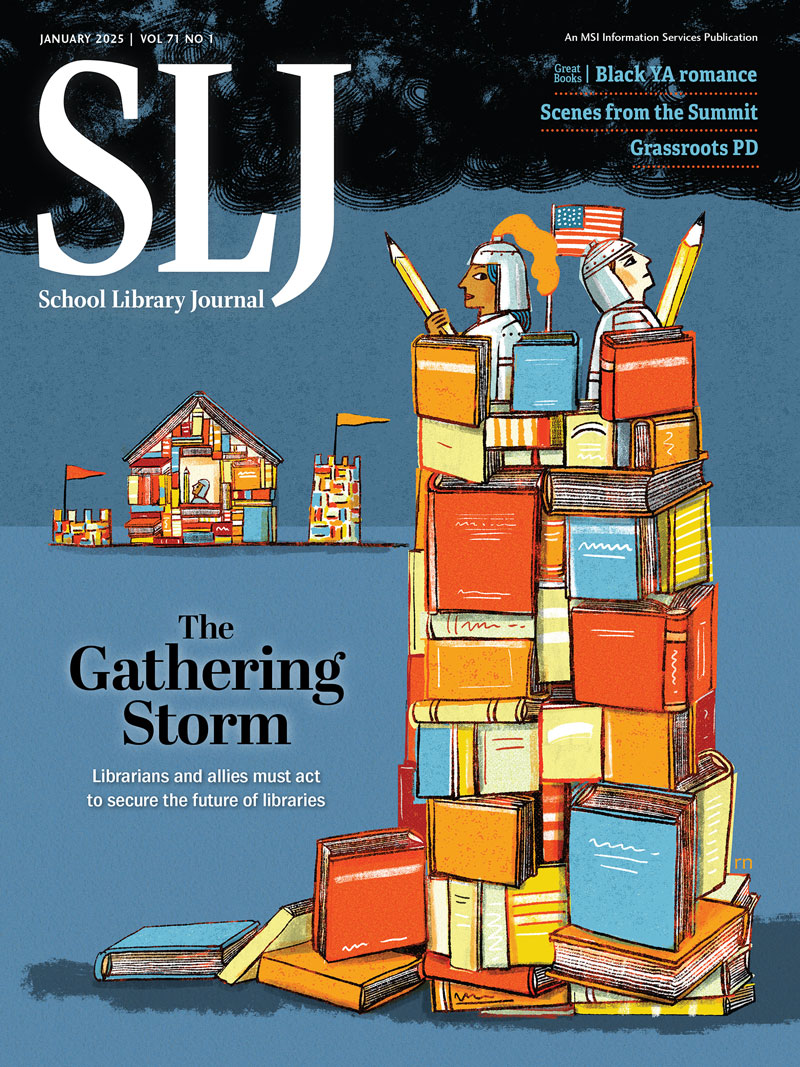Librarians and Allies Must Act to Secure the Future of Libraries and Intellectual Freedom
With the expected attempts to enact the plans defined in Project 2025, librarians must act strategically within their schools, communities, and local and state legislation to ensure the future of libraries. Experts share tactics and advice for the upcoming fight.
 |
Illustration (above) and SLJ January Cover (below) by Robert Neubecker |
As the adage goes, “The best defense is a good offense.” School library advocates are taking it to heart, surveying the post-election landscape—federal, state, and local—and readying themselves for the next wave of conservative agenda proposals.
National and grassroots organizers anticipate continued attacks on books, curriculum, libraries, and educational institutions, as well as educators, including librarians; and they have a multilayered, proactive approach to try to safeguard them. They are doubling down on legislative and policy priorities, expanding coalitions, and sharpening strategies.
John Chrastka, founder and executive director of the national nonprofit advocacy organization EveryLibrary, called for state library associations and other advocates to lobby for legislative and administrative changes that will preserve the future of school librarians and school library programs. He pointed to the Heritage Foundation’s Project 2025 as one of the reasons education and library advocates need to stay focused in this challenging climate.
“A core component of Project 2025 is the diminishment or eventual end of public education to the exclusion of library programs; to the exclusion of art programs and music and history and English, eventually,” says Chrastka. “And privatization, charters, vouchers as a core component of that perspective that they have on how education should be done is going to be advanced.”
That regressive agenda, he says, is an extension of what’s been taking place in Florida over the last several years, with librarians forced to attend what he calls “[Governor] Ron DeSantis reeducation camps” before they are allowed to purchase materials for their schools.
“If that happens for compliance with Department of Education grant programs, my goodness, what would that look like regardless of where you sit?” he says.
And while closing the Department of Education is likely a very difficult task to accomplish, a more widespread push to attach conditions to funding could gain traction, says Alan Inouye, interim associate executive director, public policy and advocacy for the American Library Association (ALA). That could mean rewarding or punishing schools that provide certain types of materials to their students.
 “Having strings attached to funding is something that we would definitely object to,” he says.
“Having strings attached to funding is something that we would definitely object to,” he says.
Additionally, it’s not just direct funding that could be in jeopardy. For instance, public service loan forgiveness programs are being eyed for elimination, which could hurt school librarians who took out student loans to pay for graduate school, Inouye says. Slashing federal work study programs could have a negative impact on grad students who work in the library to help get through school.
“There are many other things that are not targeted to school librarians or librarians, but are of great importance nevertheless,” says Inouye.
Under Project 2025, federal oversight protections—and funding—for education would be reallocated to state and local governments. In certain areas that could mean more censorship and less autonomy for librarians. But since the majority of education oversight and funding already rests with state and local authorities, Chrastka says, that’s where EveryLibrary is advising school library leaders to center their 2025 agenda.
“Regardless of what happens federally, the states have a Constitutional responsibility to educate their children, and that state constitutional responsibility to educate their children means that we should have the systems in place to support the future of school librarian work and the structure of school library programs,” he says.
He recommends that state library associations and stakeholders propose these seven bills:
• A mandatory ratio of school librarians and support staff to students or schools.
• A fiscal note outlining a five- to seven-year plan for implementing the librarian-to-student ratio.
• Comprehensive K–12 school library program standards with goals, aims, and metrics.
• A formal job description for school librarians outlined in legislation or administrative rules that lays out criteria for their roles, as well as how the positions are to be evaluated and reviewed.
• A collection modernization fund or incentive grant programs that would provide financial support to help schools update and diversify their collections.
• A position at the state Department of Education that focuses on school libraries, and the integration of school libraries into multitiered systems of support.
• A School Library Right to Read Bill, which recognizes the importance libraries play in students’ lives by affirming their First Amendment rights, ensuring equity, and safeguarding against censorship.
Chrastka emphasizes how this legislative agenda aims to preserve these institutions. For example, in 2023 in Montana, then-state superintendent Elsie Arntzen proposed a rule change that would lower the ratio of school librarians to students to 3,000 to 1 instead of 300 to 1. But the Montana Library Association fought back and won, Chrastka says. EveryLibrary assisted with digital tools and technical assistance. And the library association partnered with the education union, which he says is significant.
“While the structure of education is local and state level, the union community, if you have them, needs to be your best ally,” Chrastka says.
Expand reach
Inouye seconds any efforts toward building allyship. In the weeks following the 2024 general election, ALA held a webinar for its members to discuss the potential impact of the election and next steps. One of the key takeaways was to link up with other organizations that have shared values.
“Right now is really the time to take stock of what materials and resources we have, what allies we have, and reach out to them to make sure that we’re in contact and in concert,” says Inouye. “Think about developing new allies, new relationships, new coalitions, partnerships.”
Book publisher Penguin Random House (PRH) is one of those allies that’s poised to jump in where needed. Rosie Stewart, PRH senior manager, public policy, has been actively involved in setting priorities and building coalitions since being hired for the newly created position several months ago.
PRH is lending its might to the cause because the company is invested in advancing free expression and the First Amendment, legislatively. The focus for 2025 will be on advocating, educating, and fostering alliances with legislators across the political spectrum to protect access to books and the right to read.
“Our fundamental mission as a company is making books for readers of all identities and ensuring that our authors have the right to have their work read,” Stewart says.
Stewart highlights how important gaining support for legislation to protect books and librarians is in the face of these threats, especially since the opposition keeps refining its approach. She’s seeing more resolve from advocates post-election to move these bills forward. The trends are clear that opponents do not plan to back down in 2025. And that’s why taking this on state by state is critical.
“The sponsor of the last book banning effort in Texas, my home state, has just pre-filed a new bill that would put it in the hands of the State Board of Education to ban books statewide…. We expect that this is only going to expand and that those censorship models are going to be copied from one state to the next. But this playing field is extremely diverse. It’s state by state, it’s county by county.”
Inouye also urges those in the library world to look beyond their existing coalitions and reach out to people in their communities. Have members of the public, not just librarians and library workers, talk about the importance of libraries.
Continued proactive outreach, Inouye says, helps to build understanding and will lay the groundwork in advance of a threat.

One voice, one goal
Lynette Mejía, executive director of Louisiana Citizens Against Censorship (LaCAC), says one of the benefits of building a coalition is that when there is a fight, everyone is aligned.
“We spoke with one voice,” she says about the organization’s efforts challenging bills that would criminalize librarians. “I would really say to anyone who is facing the same kinds of challenges, think about, really brainstorm, the kinds of organizations and groups, people within your state who have a vested interest in seeing these bills defeated and reach out to them. Come together, have a unified strategy, have unified messaging.”
Mejía also stresses that the anti-library types operate in the dark as much as possible because “they know the vast majority of people are not just against it, but outraged.”
“So one of our biggest missions, both on the local level and the statewide level, is outreach,” she says. “We table at festivals, we table at fairs, we use social media very heavily. We try to reach as many people as possible because so many of those people say, ‘Oh my gosh, I had no idea this was happening in our library.’ But when they do find out, they’re activated.”
Mejía credits the National Coalition Against Censorship for assembling the Kids’ Right to Read Network, which connects grassroots organizations. She says they have a Discord server where they discuss what’s happening. There are monthly webinars and Zoom meetings where members can share resources, ask questions, or present strategies that worked.
LaCAC will continue to focus its grassroots advocacy on state and local elections and legislation. Last year the group was part of a coalition that successfully defeated three pieces of legislation aimed at libraries and librarians. One bill, HB 777, proposed putting librarians in jail for up to two years with hard labor for spending any public money with ALA.
“None of the legislators who introduced those bills are going away,” Mejía says. “So we are, of course, concerned that we are going to see some form of those types of bills again.”
She also anticipates some ballot measures in 2025 related to defunding libraries. Two of the parish systems, St. Tammany and Lafayette, have millage elections coming up, which could impact funding for libraries. They will also be watching the charter school movement, which siphons money from public schools, she says, and school closings.
“For example, where I live in Lafayette, our local school budget is very tight now, so they’re looking at closing schools, they’re looking at consolidating schools,” she says. “Through that effort, we’re going to have some librarian positions that I’m sure are going to be cut.”

The good and the bad
Both Chrastka and Inouye anticipate a host of legal battles this year. But they say there’s a lot to be hopeful about also.
The New Jersey Legislature recently passed the Freedom to Read Act, which would establish requirements for materials in school libraries and protect library staff from harassment. It was signed by Governor Phil Murphy in December.
“We have language coming together in Delaware for a school Right to Read bill,” Chrastka says. “There are significant protections passed this last year on K–12 Right to Read in California and in Minnesota. There’s a framework in Pennsylvania that’s really robust, that hasn’t advanced very far, unfortunately. But there’s some good stories out there for K–12 Right to Read as well.”
Chrastka also referenced a 2023 survey from the EveryLibrary Institute, the group’s nonprofit arm, and Book Riot collecting parents’ attitudes toward book bans and asking their perceptions of librarians’ trustworthiness.
“Parents around America, guardians of kids, grandparents who have the kids in their care do not want to see censorship used in the schools,” he says. “They want to see teachers empowered. They want to see school librarians empowered. The average American parent who responded to our survey, 84 percent of them said that school librarians matter. Nine out of 10 of them want to see a school library in their school. Only 8 percent of parents came back and said censorship should be used against the collection for every kid.”
So part of the EveryLibrary strategy is to have conversations about civil society, Chrastka says.
“What kind of town do we want to be? How do we want to treat our kids? How do we want to treat somebody else’s kids? Do we want to be left alone to make decisions for our own family? Do we want to contribute to something as important as the public school or the public library to be good neighbors?”
Inouye advises reframing the discussion with those who will be in power so it resonates with them. Take Linda McMahon, whom President-elect Trump nominated for Secretary of Education. She is the former head of the Small Business Administration and a successful businessperson, Inouye says.
“Is there a way to make the argument of how school libraries and school librarians are important contributors to future entrepreneurs and small businesspeople? How do you make that connection? Why should she care about school libraries?” he says.
So he’s strategizing how to have those conversations. “This is why you should care and why it’s relevant to you.”
Stewart agrees. She underscores how important it is to understand your audience so you can break through.
“We know that different messages are going to work in different places and with different audiences. So we need each of these different groups talking to their own constituencies and coming together,” she says. “We all have to be building the advocacy infrastructure and understanding where the censorship movement is going next to be able to effectively push back.”
She says part of her job as a convener is bringing folks together to have conversations and educating them no matter where they fall on the issue.
“I will talk to any legislator of any stripe at any time. I would sit down with Moms for Liberty tomorrow if they asked me to,” she says. “There are a lot of commonalities, particularly when you look at folks who are really strong believers in the First Amendment. That’s a belief that I think cuts across partisan lines.”
Stewart and Inouye offer reasons for hope amid the ongoing difficult work.
“If you looked at some of the election results on the local level, Moms for Liberty–backed school board candidates lost in several cases,” she says. “I believe that when censorship is on the ballot, it loses. But we just have to make sure that people understand that it is on the ballot and exactly where these threats are coming from.”
Inouye also notes that Trump, in particular, was unpredictable in his first term. For example, the Museum and Library Services Act was reauthorized during his administration.
“We must not give up hope,” he says. “Our mission is so important and so noble, whether it’s a school librarian or a public librarian or an academic librarian. All the work that we do in service of our community, and we just need to continue ahead as well as we can.”
Christina Joseph is an editor, writer, and content strategist with expertise in race relations, immigration, education, health care, and government.

RELATED
The job outlook in 2030: Librarians will be in demand
The job outlook in 2030: Librarians will be in demand
ALREADY A SUBSCRIBER? LOG IN
We are currently offering this content for free. Sign up now to activate your personal profile, where you can save articles for future viewing






Add Comment :-
Be the first reader to comment.
Comment Policy:
Comment should not be empty !!!